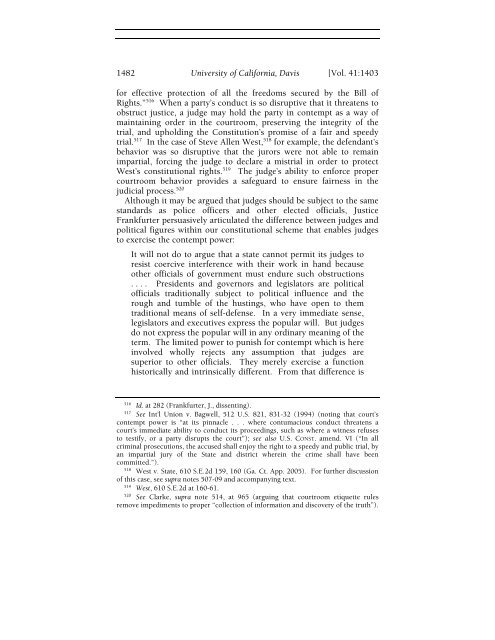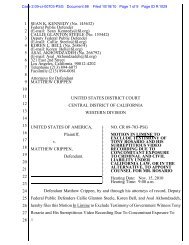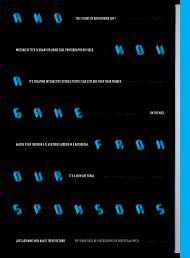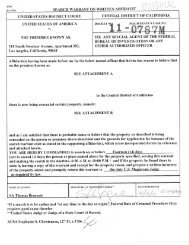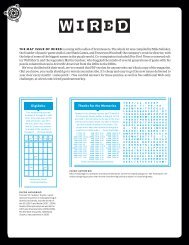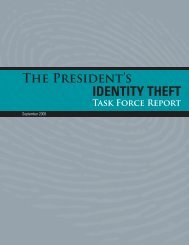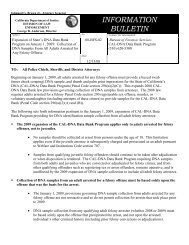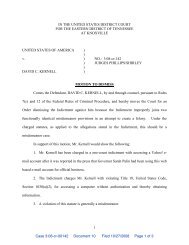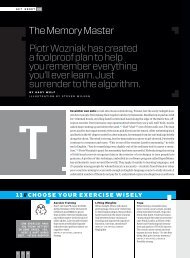Digitus Impudicus: The Middle Finger and the Law - Wired
Digitus Impudicus: The Middle Finger and the Law - Wired
Digitus Impudicus: The Middle Finger and the Law - Wired
Create successful ePaper yourself
Turn your PDF publications into a flip-book with our unique Google optimized e-Paper software.
1482 University of California, Davis [Vol. 41:1403<br />
for effective protection of all <strong>the</strong> freedoms secured by <strong>the</strong> Bill of<br />
Rights.” 516 When a party’s conduct is so disruptive that it threatens to<br />
obstruct justice, a judge may hold <strong>the</strong> party in contempt as a way of<br />
maintaining order in <strong>the</strong> courtroom, preserving <strong>the</strong> integrity of <strong>the</strong><br />
trial, <strong>and</strong> upholding <strong>the</strong> Constitution’s promise of a fair <strong>and</strong> speedy<br />
trial. 517 In <strong>the</strong> case of Steve Allen West, 518 for example, <strong>the</strong> defendant’s<br />
behavior was so disruptive that <strong>the</strong> jurors were not able to remain<br />
impartial, forcing <strong>the</strong> judge to declare a mistrial in order to protect<br />
West’s constitutional rights. 519 <strong>The</strong> judge’s ability to enforce proper<br />
courtroom behavior provides a safeguard to ensure fairness in <strong>the</strong><br />
judicial process. 520<br />
Although it may be argued that judges should be subject to <strong>the</strong> same<br />
st<strong>and</strong>ards as police officers <strong>and</strong> o<strong>the</strong>r elected officials, Justice<br />
Frankfurter persuasively articulated <strong>the</strong> difference between judges <strong>and</strong><br />
political figures within our constitutional scheme that enables judges<br />
to exercise <strong>the</strong> contempt power:<br />
It will not do to argue that a state cannot permit its judges to<br />
resist coercive interference with <strong>the</strong>ir work in h<strong>and</strong> because<br />
o<strong>the</strong>r officials of government must endure such obstructions<br />
. . . . Presidents <strong>and</strong> governors <strong>and</strong> legislators are political<br />
officials traditionally subject to political influence <strong>and</strong> <strong>the</strong><br />
rough <strong>and</strong> tumble of <strong>the</strong> hustings, who have open to <strong>the</strong>m<br />
traditional means of self-defense. In a very immediate sense,<br />
legislators <strong>and</strong> executives express <strong>the</strong> popular will. But judges<br />
do not express <strong>the</strong> popular will in any ordinary meaning of <strong>the</strong><br />
term. <strong>The</strong> limited power to punish for contempt which is here<br />
involved wholly rejects any assumption that judges are<br />
superior to o<strong>the</strong>r officials. <strong>The</strong>y merely exercise a function<br />
historically <strong>and</strong> intrinsically different. From that difference is<br />
516 Id. at 282 (Frankfurter, J., dissenting).<br />
517 See Int’l Union v. Bagwell, 512 U.S. 821, 831-32 (1994) (noting that court’s<br />
contempt power is “at its pinnacle . . . where contumacious conduct threatens a<br />
court’s immediate ability to conduct its proceedings, such as where a witness refuses<br />
to testify, or a party disrupts <strong>the</strong> court”); see also U.S. CONST. amend. VI (“In all<br />
criminal prosecutions, <strong>the</strong> accused shall enjoy <strong>the</strong> right to a speedy <strong>and</strong> public trial, by<br />
an impartial jury of <strong>the</strong> State <strong>and</strong> district wherein <strong>the</strong> crime shall have been<br />
committed.”).<br />
518 West v. State, 610 S.E.2d 159, 160 (Ga. Ct. App. 2005). For fur<strong>the</strong>r discussion<br />
of this case, see supra notes 507-09 <strong>and</strong> accompanying text.<br />
519 West, 610 S.E.2d at 160-61.<br />
520 See Clarke, supra note 514, at 965 (arguing that courtroom etiquette rules<br />
remove impediments to proper “collection of information <strong>and</strong> discovery of <strong>the</strong> truth”).


